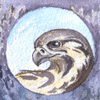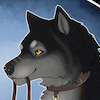
don't call anyone "a prey" if you can't catch it
ps- i finished coffee-story! should translate it and soon will show
ps- i finished coffee-story! should translate it and soon will show
Category Artwork (Traditional) / Comics
Species Unspecified / Any
Size 911 x 1280px
File Size 241 kB
Hi Lavender, here are my notes on translating the text to native sounding American English:
Owl, you look like a hare to me! Now I'll show you how I play with hares.
I'm not like a hare, hares can't fly.
Here's an alternate:
Ow, Owl! Then you are like a hare to me, and now I'll show you how I play with hares.
I'm different from a hare, they can't fly.
Notes:
The phrase "are like" or "look like" seems more natural than "is similar to" or "look similar to". The word "like" can be used in so many different ways that a reader must interpret the meaning from how the word is used (as a noun, verb, adjective, adverb, conjunction, etc.): http://www.dictionary.com/browse/like That is probably easy/natural for a native speaker but more difficult to learn/translate. To add to the difficulty, there is also an idiomatic overuse of the word "like" in certain geographic regions.
I just added the "Ow" (expression for mild pain) for fun and because it looks/sounds similar to Owl. It gives the impression that playful Owl grabbed or bit Wolf hard enough to cause Wolf mild pain while treating him as 'prey' (in the previous picture) so now Wolf has decided to retaliate playfully and Owl thus decides to fly away from the much larger Wolf. I think that fits the theme of the previous picture and this one.
Owl's quote from the previous picture: - Hoo-hoo, do you know why Wolf is similar to a mouse?
could also be translated as: - Hoo-hoo, do you know why Wolf is like a mouse? [this sounds a bit more natural]
or even as: - Hoo-hoo, do you know why you, Wolf, are like a mouse? [this has the effect of rhyming "hoo" with "you"]
The words "hare" and "rabbit" are often used interchangeably in English, but they actually describe different species/genus of animals. As an example of the confusion of how the words are used, a jackrabbit is actually a hare. The word "hare" has a more wild/undomesticated connotation so it is probably the best choice for this, but the discussion would also look fine with the word "rabbit".
Owl, you look like a hare to me! Now I'll show you how I play with hares.
I'm not like a hare, hares can't fly.
Here's an alternate:
Ow, Owl! Then you are like a hare to me, and now I'll show you how I play with hares.
I'm different from a hare, they can't fly.
Notes:
The phrase "are like" or "look like" seems more natural than "is similar to" or "look similar to". The word "like" can be used in so many different ways that a reader must interpret the meaning from how the word is used (as a noun, verb, adjective, adverb, conjunction, etc.): http://www.dictionary.com/browse/like That is probably easy/natural for a native speaker but more difficult to learn/translate. To add to the difficulty, there is also an idiomatic overuse of the word "like" in certain geographic regions.
I just added the "Ow" (expression for mild pain) for fun and because it looks/sounds similar to Owl. It gives the impression that playful Owl grabbed or bit Wolf hard enough to cause Wolf mild pain while treating him as 'prey' (in the previous picture) so now Wolf has decided to retaliate playfully and Owl thus decides to fly away from the much larger Wolf. I think that fits the theme of the previous picture and this one.
Owl's quote from the previous picture: - Hoo-hoo, do you know why Wolf is similar to a mouse?
could also be translated as: - Hoo-hoo, do you know why Wolf is like a mouse? [this sounds a bit more natural]
or even as: - Hoo-hoo, do you know why you, Wolf, are like a mouse? [this has the effect of rhyming "hoo" with "you"]
The words "hare" and "rabbit" are often used interchangeably in English, but they actually describe different species/genus of animals. As an example of the confusion of how the words are used, a jackrabbit is actually a hare. The word "hare" has a more wild/undomesticated connotation so it is probably the best choice for this, but the discussion would also look fine with the word "rabbit".

 FA+
FA+











Comments